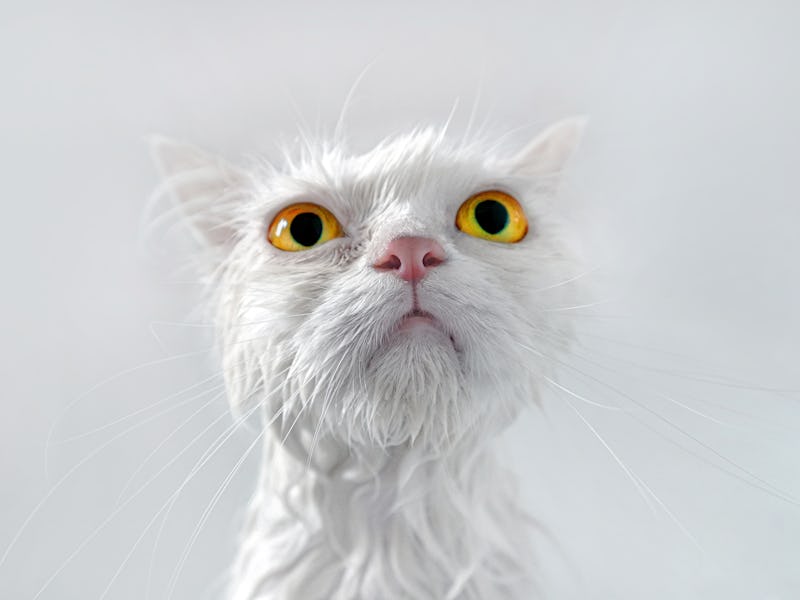Why Do Cats Hate Water? The Aversion Has A Simple Answer
Though water-averse, cats do know how to swim.

Given the choice, most cats would do just about anything to avoid getting wet. While this phobia might seem a bit extra, it turns out our feline companions have a good reason to avoid water — and it all comes down to science.
Cats don’t have blowdryers
“Cats as a species tend to avoid water,” says Malini Suchak, an anthrozoology professor at Canisius University in New York. This aversion, she says, isn’t due to a preservation instinct; cats can both swim and float if necessary. Rather, experts suspect that this hydrophobia comes from water’s effects on their fur coats, though Suchak isn’t aware of any formal investigations of the behavior.
Whether a cat is long- or short-haired will affect how long it takes for them to dry, but generally, Suchak tells Inverse, cats possess an insulating undercoat and a protective outer coat. She suspects that a soaked cat feels very uncomfortable with a sopping wet undercoat, even if the outer coat dries more quickly. She likens this to activewear layers, with a water-resistant outer layer and an insulating inner layer that, once wet, can become insufferable to wear.
Cats’ fur isn’t nearly as water-resistant as other animals’ outer layers, like a duck’s feathers. This lack of weather-proofing comes from their ancestor, the Near Eastern wildcat. This small feline comes from dry, arid climates throughout Africa, southwest and central Asia, India, and Mongolia, so it’s not equipped for wetness.
You’ve probably noticed that your cat opts for warmer over cooler spots, like sun patches, the heater, or your laptop keyboard. This penchant for warmth can make water even less appealing, says Monique Udell, professor of agricultural sciences and director of the Human-Animal Interaction Laboratory at Oregon State University, since it can cool them down.
Cats also fastidiously groom themselves, even when there’s not a drop of water near them. “Half the time after you just pet them they sit there and groom and get everything back into place and smelling how it should,” Suchak says. If your cat insists on licking itself after you muss its fur with a quick snuggle, think how enraged it would be if their coat dripped with water.
Cats need therapy, too
Some cats, Suchak points out, may not only dislike water but have a consummate fear of it, which may come from a previous experience. If they accidentally slipped into a full bathtub or were forced into a bath after being captured — an already stressful, scary situation — that can do a number on them. Cats, being the brutally honest animals that they are, will make it very painfully clear when they feel something between displeased and terrified.
While a distaste for wetness may be a general rule in cats, there are always exceptions. “Some love playing in water and getting wet,” says Udell. Some cat parents undoubtedly include turning on and off the sink or bath faucet as part of their daily routine with their kitties. This preference, she says, varies with each cat, and potentially by breed. Water can even make for an enriching toy for some cats; they might be mesmerized by its flow or might enjoy toys bobbing on the surface.
“I guess it just goes to show that like anything else, cats are ok with water as long as it’s on their own terms,” Suchak says.
It may be unlikely that your cat is a water lover, but it’s worth paying attention to whether they prowl around running faucets. Your cat just might surprise you.